
2020 Accomplishments
Click above to watch our 3-minute 2020 Highlights video, and click here to support our work.
Joint Center Community:
Framed by the pandemic and systemic inequality, 2020 was a difficult year for Black communities.
The team at the Joint Center quickly responded to the pandemic and recession. Early on—when the way forward was unclear—we regularly convened Black community leaders and policymakers to discuss challenges and solutions, produced weekly summaries of the most recent data and policy developments, and successfully urged the CDC to disclose COVID-19 data by race.
The Joint Center continued our long-standing work to address systemic economic inequity. The Paycheck Protection Program for small businesses, for example, failed many Black businesses because it was not designed to be accessible to them. The Joint Center organized a virtual convening to discuss solutions for fair access to capital for Black businesses with former SBA Deputy Administrator Marie Johns and others, and another convening to discuss solutions for Black workers with U.S. House Education and Labor Chair Bobby Scott (D-VA) and many others. Following up on those events, we published concrete solutions, many of which were enacted into law in December 2020.
We led on critical tech policy debates. We wrote a leading law review article explaining why big tech companies are not exempt from civil rights laws. We also testified before Congress twice and submitted comments to the FCC opposing legal “reforms” to the Communications Decency Act that would discourage tech platforms from removing discriminatory disinformation (the “reforms” were not passed by Congress). We convened FCC Commissioner Geoffrey Starks and Black leaders to discuss implications of the digital divide during the pandemic and later published detailed analysis and solutions (including a $50 per month broadband subsidy which became federal law in December 2020). We successfully recruited former Aspen Institute Digital Program Director Dr. Dominique Harrison to lead the Joint Center’s Tech Policy Program.
During a critical election year when voting procedures were in flux, we facilitated Black civic participation. We organized two virtual briefings on the unique challenges faced by Black voters during the pandemic and solutions featuring Stacey Abrams, Black Voters Matter co-founder LaTosha Brown, U.S. House Elections Chair Marcia Fudge, and many others, and later published data, analysis, and solutions on the topic.
We led on increasing diversity among top staff in the U.S. House and Senate and in presidential appointments. We published a major report showing people of color are 40% of the U.S. population but only 11% of U.S. Senate personal office top staff, and launched a targeted community education campaign as newly-elected Members sought to fill over 200 top staff openings. We saw progress, including the creation and staffing of a bipartisan U.S. House Diversity & Inclusion Office and a 200% increase in Black Senate personal office top staff since 2015. We also vetted and submitted the names of hundreds of strong Black candidates to the Biden-Harris transition team for consideration for appointments.
We celebrated our 50th Anniversary by convening leading voices to envision the economic agenda for Black America, by welcoming to our board MacArthur Foundation VP Kenneth Jones and WK Kellogg Foundation VP Carla Thompson Payton, and by updating our mission statement.
Details are below, and watch our 3-minute 2020 highlights video above. Click here for a printable PDF of our 2020 annual report.
Thank you,
Spencer Overton
President
Special Initiative: COVID-19, Policy, and
Black Communities
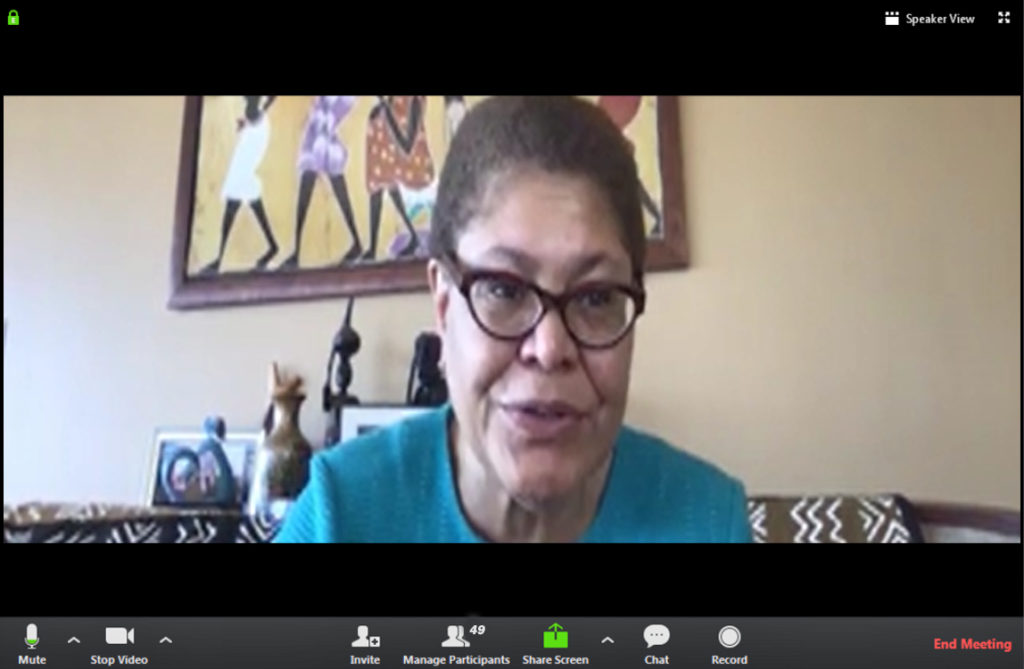
Joint Center virtual policy town hall with
Congressional Black Caucus Chair Karen Bass (D-CA)
The Joint Center quickly responded to the COVID-19 pandemic and recession.
Convening Black community leaders & policymakers: When information was changing daily about the pandemic, layoffs, business closures, and federal policy responses, we convened 6 online policy events to ensure Black community leaders had up-to-date information and a platform to articulate their most pressing concerns to policymakers. We started with a March 26 event on the stimulus featuring Congressional Black Caucus Chair Karen Bass (D-CA) and leaders from organizations like A Philanthropic Partnership for Black Communities (ABFE), African American Mayors Association, the Black Economic Alliance, the Black Futures Lab, Black Voters Matter, the Boule, Color of Change, Delta Sigma Theta, NAACP, NAACP LDF, National Action Network, the National League of Cities, the National Organization of Black County Officials, the National Urban League, Repairers of the Breach, the Southern Education Foundation, the Southern Rural Black Women’s Initiative, and U.S. Black Chambers, Inc.
Weekly Roundups documenting impact of COVID-19 on Black communities: Starting in March, we kept policymakers informed about the most recent data on the impact of the pandemic on Black communities, kept Black communities informed about the most recent federal developments, and chronicled activism in Black communities by producing over 30 weekly roundups.
Prompting federal, state & local governments to disclose data to understand COVID-19’s racial impact: At the beginning of April—before the disparate impact of COVID-19 on Black communities was clear and only a few localities were disclosing racial data—we wrote a Washington Post op-ed urging federal, state, and local governments to release racial data on COVID-19 cases and deaths. The CDC eventually started reporting this data, as did many states and localities. In late April Congress passed and the president signed a federal law mandating that the HHS provide a monthly report on COVID-19 cases and deaths disaggregated by race.

Prioritizing COVID-19 federal relief priorities for Black communities: The Joint Center analyzed the potential impact of the $3 trillion HEROES Act on Black communities. We also published a 20-page report on Pandemic Relief Priorities for Black Communities, which contains many proposals that became federal law in December 2020.
Speaking out: The Joint Center spoke on COVID-19 and Black communities at leading events organized by AARP, Alabama Pro-Growth Policy Conference, Black Voters Matter, CBCF Annual Legislative Conference, Comcast, JPMorgan Chase Institute, Kingdom Fellowship AME’s Black Idea Summit, Knight Foundation, NCNW, Opportunity Finance Network, ProPublica, The Satcher Health Leadership Institute at Morehouse School of Medicine, Morehouse College International Comparative Labor Studies, and the Health Equity Cypher, and many others.
Our work garnered coverage in several news outlets, including: Center for Public Integrity, Committee for Economic Development and the Conference Board’s podcast Sustaining Capitalism, New York Times, and Time Magazine.
Economic Studies
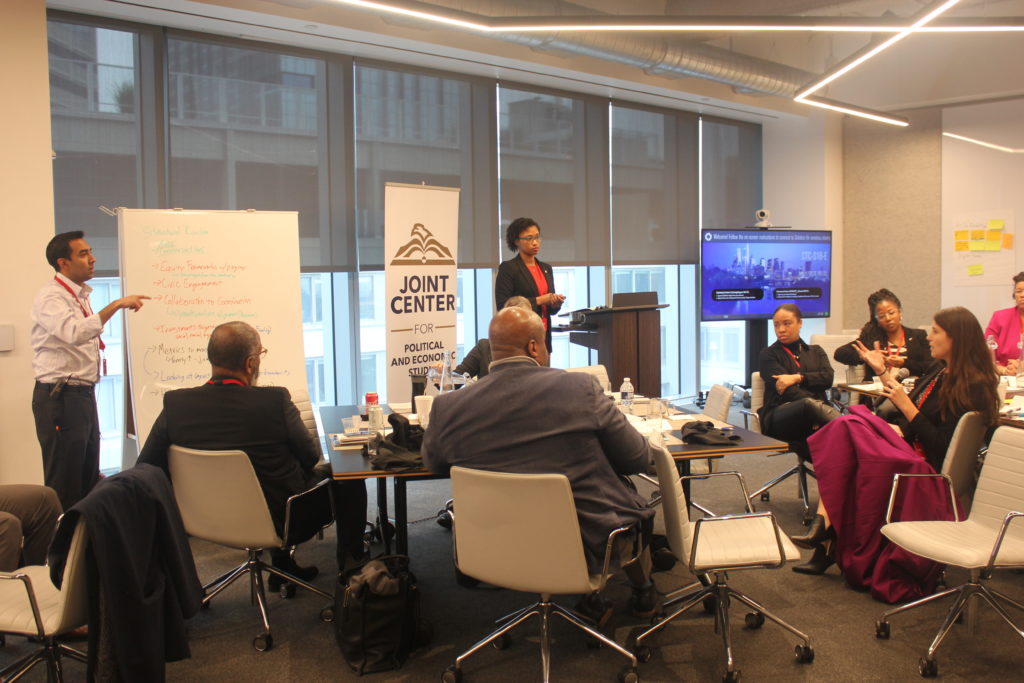
Joint Center future of work roundtable in Philadelphia in February.
Before the pandemic, the Joint Center organized, published, and built capacity on the future of work. We organized a future of work roundtable in Philadelphia to discuss the implications of the changing nature of work on African Americans in the Philadelphia region. We released a final 49-page report on the Future of Work and the Black Rural South, and just before the year began we released our survey of over 1,200 Black Americans in partnership with Third Way–A Nuanced Picture of What Black Americans Want in 2020. We hosted a discussion with U.S. House Education and Labor Committee Staff Director Veronique Pluviose and U.S. Senate Commerce, Science, and Transportation Committee Staff Director David Strickland. We also organized a panel on the future of work and Black communities at the annual convention of ABFE: A Philanthropic Partnership for Black Communities (formerly the Association of Black Foundation Executives). We co-hosted a panel discussion with Third Way to discuss our co-authored report, A Nuanced Picture of What Black Americans Want in 2020.
Speaking out: We spoke on racial inclusion at leading future of work events organized by Annie E. Casey Foundation, National Skills Coalition, FCC Commissioner Geoffrey Starks, and the Workforce Matters Funders Network Steering Committee, and wrote or co-wrote op-eds on the topic for Inside Sources, NationSwell, and Lumina. Our research also garnered news coverage in several publications, including: Axios, Black America Web, CBS News, Chicago Tribune, International Business Times, MSNBC (Part 1), MSNBC (Part 2), Nationswell, Newsweek, Raw Story, The Economist, and The Nation.
As the pandemic disproportionately drove layoffs in Black communities, the Joint Center responded: We organized a virtual event on education and workforce priorities for Black communities in stimulus legislation featuring U.S. House Education and Labor Chair Bobby Scott (D-VA), The Education Trust President and CEO & Former Secretary of Education John King, National Urban League Senior Vice President for Policy & Advocacy Clint Odom, National Education Association Vice President (now President) Becky Pringle, and National Black Worker Center Project Executive Director Tanya Wallace-Gobern. We also published concrete solutions in the “Provide Financial Support for Black Workers” section of our pandemic relief report, including an extension of the federal supplement to state unemployment insurance, increasing SNAP benefits, and providing rental assistance (our proposals became federal law in December 2020).
The first stimulus failed Black businesses (between February and April 2020 41% of Black businesses closed), and the Joint Center responded: We organized a virtual event on fair and equal access to capital for Black businesses in COVID-19 stimulus legislation featuring former SBA Deputy Administrator Marie Johns, Opportunity Finance Network President & CEO Lisa Mensah, Association for Enterprise Opportunity President & CEO Connie Evans, U.S. Black Chambers President & CEO Ron Busby, and TV One Chairman and CEO & Radio One President Alfred Liggins. We also published concrete solutions in the “Sustain Black Businesses” section of our pandemic relief report, including an extension of the covered period for forgiveness for Paycheck Protection Program Loans, streamlining the forgiveness process, mandating demographic data collection on loans, and significant funding for Community Development Financial Institutions and Minority Depository Institutions (these proposals became federal law in December 2020).
The Joint Center’s economic work gained particular attention after many Americans witnessed the killing of George Floyd and realized that systemic racism infects all elements of our society—including the economy: We spoke on racial inclusion at leading economic policy events organized by Aspen Institute, The Atlantic, Economic Policy Institute, Groundwork Collaborative, Latinos for Secure Retirement, and Ford Foundation, Omidyar Network, and the Washington Center for Equitable Growth, and contributed to the report “Unpacking Inequities in Unemployment Insurance.” We wrote Investing in Black Economics and Centering Black Communities in Economic Policy.
Tech Policy
The Joint Center became a leading voice on Black communities and online disinformation.
Pushing back on claims that big tech companies are exempt from federal civil rights laws: In response to claims that social media companies could freely target and deliver ads along racial lines (e.g., employment and housing ads away from Black users, voter suppression ads toward Black users), we wrote the law review article State Power to Regulate Social Media Companies to Prevent Voter Suppression, which concluded that online platforms materially contribute to discrimination when they deliver particular ads along racial lines and thus do not obtain legal immunity under Section 230 of the Communications Decency Act. We hosted the panel Should Congress Amend The Communications Decency Act to Address Discriminatory Ad Targeting by Social Media? with Energy and Commerce Vice Chair Congresswoman Yvette Clark, Communications and Technology Chair Congressman Mike Doyle, 2019 MacArthur Professor Fellow Danielle Keats Citron, former Wikimedia GC Mike Godwin, Stanford Cyber Policy Center Platform Regulation Director Daphne Keller, Fordham Law Professor Olivier Sylvain, and Joint Center President Spencer Overton.
Highlighting and preventing coordinated disinformation campaigns targeted to suppress Black votes: The Joint Center used data and analysis to push back on the Trump Administration’s attempts to rewrite Section 230 in a way that would discourage tech companies from removing voter suppression disinformation. In doing this, we testified twice before Congress (for subcommittees of the House Energy and Commerce and the House Administration committees), answered questions for the record following up from the Energy and Commerce and House Administration congressional appearances, submitted comments to the FCC, and published an op-ed in Slate about a U.S. Senate Section 230 hearing with big tech CEOs held less than a week before Election Day. As a result of our efforts and those of our allies, Google, Twitter, and Facebook expanded their policies to protect U.S. elections, and Congress did not rewrite Section 230 in a way that discouraged companies from responsible content moderation.
Producing solutions for families without internet during the pandemic: As the pandemic forced many students, workers, and patients to turn to broadband for virtual learning, telework, job searches, government assistance applications, and medical services, the Joint Center took action to support the millions of Black households that lack high-speed home internet. On April 7—as virtual workplaces and schools were emerging for some communities but not others—we convened Black organizations for a digital divide and connectivity stimulus session with FCC Commissioner Geoffrey Starks and expert respondents Children’s Defense Fund Southern Regional Director Oleta Fitzgerald, NAACP LDF Director of Policy Lisa Cylar Barrett, Brookings Fellow Dr. Nicol Turner-Lee, Comcast External Affairs ED Tony Williams, Google Strategic Outreach & External Partnerships Director Chanelle Hardy, and Public Knowledge President Chris Lewis. We published concrete solutions in the “Expand Internet Access Among Black Households” section of our pandemic relief report, including a $50 a month emergency broadband subsidy for households-in-need that was passed by both the U.S. House and Senate, signed by the President, and became federal law in December 2020.
Speaking out: We met with Biden-Harris transition team groups on tech policy issues, and emphasized universal broadband, preserving the power of companies to remove discriminatory disinformation, and protecting Black communities from the misuse of their data. The Joint Center spoke on tech policy issues relevant to Black communities at events organized by the Congressional Black Caucus Foundation, George Washington University, GW ACS, Black Law Students, and ACLU chapters, Howard University, Knight Foundation and Gallup, Leadership Conference on Civil and Human Rights, and the National Urban League. We also signed letters urging greater access to affordable broadband for Black communities, and urging the Senate Judiciary Committee leadership to oppose legislation that would discourage online platforms from removing disinformation.
Our tech policy work garnered news coverage in several publications, including: Bloomberg, Broadband Breakfast, Colorado Times Recorder, and The Hill, and we analyzed issues of market power and discrimination related to the July congressional testimony of CEOs of Amazon, Apple, Google, and Facebook.
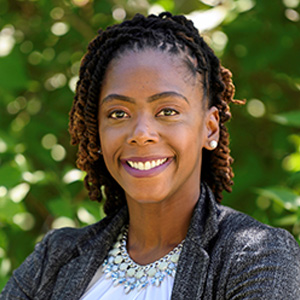
We also recruited and hired the former Project Director of the Aspen Institute’s Digital Program, Dr. Dominique Harrison, to serve as the Joint Center’s Director of Tech Policy. Dr. Harrison will lead the Joint Center’s work on Section 230, broadband access and adoption, data privacy, artificial intelligence, and other key tech policy issues affecting Black communities.
Political Studies
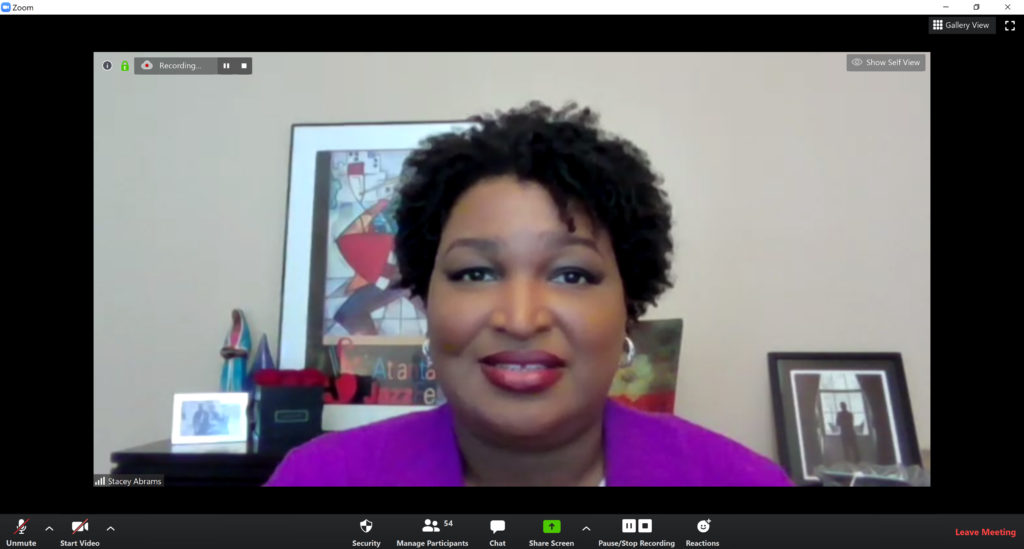
Joint Center virtual convening with
Stacey Abrams
During a critical election season in which election procedures were in flux, the Joint Center facilitated Black participation. We hosted:
- a briefing for CBC staff on accessible vote-by-mail and safe in-person voting in Black communities with Fair Fight Founder Stacey Abrams, Michigan Secretary of State Jocelyn Benson, Black Voters Matter Fund Co-Founder LaTosha Brown, Lawyers’ Committee for Civil Rights Under Law President Kristen Clarke, Leadership Conference on Civil and Human Rights President Vanita Gupta, and NAACP LDF President and Director-Counsel Sherrilyn Ifill, and
- a briefing on voting, Black communities, and the next stimulus with U.S. House Elections Chair Marcia Fudge (D-OH), National Coalition on Black Civic Participation CEO Melanie Campbell, and Colorado Division of Elections Director Judd Choate.
We published solutions to protect Black voters during the pandemic: We highlighted the unique challenges faced by Black voters during the pandemic (such as fewer community registration drives, and historically higher rates of vote-by-mail rejections by election officials and wait-times at polling places), and published solutions to protect Black voting rights in our pandemic relief report.
Speaking out: We talked about Black political participation on panels sponsored by the CBC, House Majority Whip Greater James Clyburn, Allen and Kingdom Fellowship A.M.E. Churches, the Hewlett Foundation, National Council of Negro Women, the League of Minority Voters, and the HistoryMakers. Our research also garnered news coverage in the Chicago Tribune and The New York Times. We also signed a letter to House and Senate leadership with 453 other organizations urging the U.S. House and Senate to “take swift and decisive legislative action in response to ongoing fatal police killings and other violence against Black people across our country.”
Diversity on the Hill and in the New Administration
We published new data and analysis on congressional staff diversity: Our new report—which was covered in The New York Times—revealed that people of color make up 40% of the U.S. population but just 11% of top staff in U.S. Senate personal offices in Washington, DC. We also analyzed the 2020 Senate Democratic demographic staff data and analyzed LegiStorm’s latest data on Hill staff salaries by race.
Speaking out: We signed letters in support of re-establishing the House Select Committee on the Modernization of Congress in 2021 (on Dec. 21 Speaker of the House Nancy Pelosi (D-CA) announced the extension), establishing a Senate office of Diversity and Inclusion, a resolution to modernize Congress (which included proposed guidelines for the U.S. House Office of Diversity and Inclusion and for recruiting from HBCUs), spoke on diversity at events organized by the Women in Government Relations and others, and joined Representative Democracy.
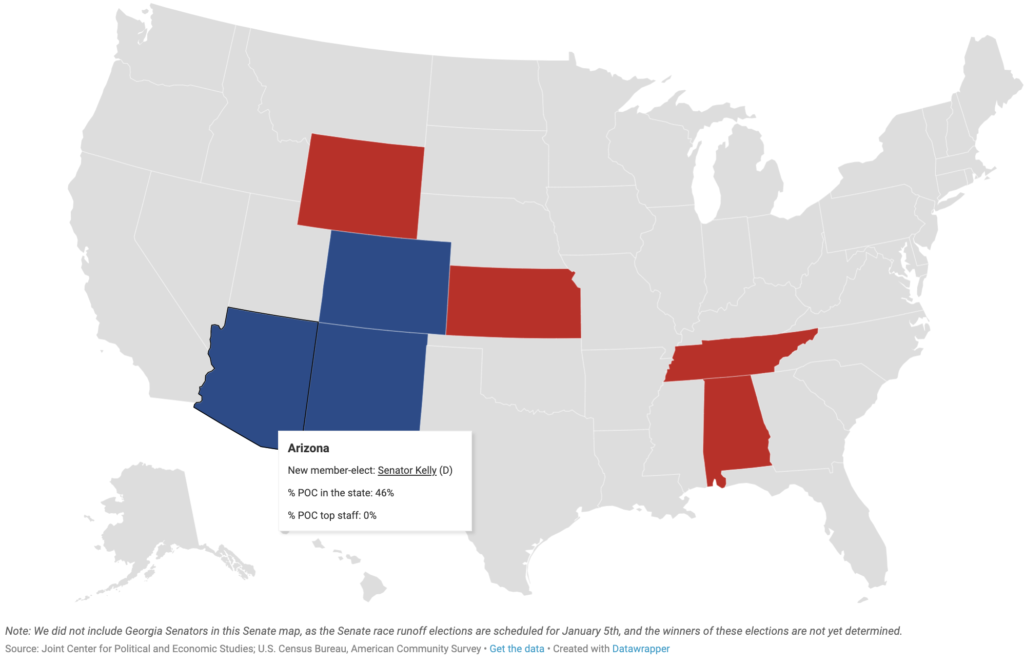
As Congress staffed up at the end of 2020 for the next Congress, we launched a diversity public education campaign, which included:
- An interactive tracker to regularly report on the racial diversity of hires by new Members for their over the 200 top staff openings (see map above)
- Organizing 70 civil rights groups to send a letter to each incoming Member of Congress urging them to hire diverse staff;
- Targeted public education through LinkedIn and various websites strategically focused on local thought leaders
- An op-ed in The Hill
- Op-eds published in numerous Black newspapers across the country; and
- A feature story on NPR’s Marketplace and an appearance on Tiffany Cross’s new MSNBC show The Cross Connection
Our work garnered news coverage and other attention, including: ABC News, Clearance Jobs, Fox News, The Hill (“New report finds top Senate staffers are more diverse than in 2015 but still predominantly white” and “Rep. Bobby Rush introduces legislation focused on addressing racism, lack of diversity in the federal government”), The Grio, MSNBC, The New York Times, Politico, Roll Call, and WURD Radio. The Select Committee on the Modernization of Congress included Joint Center research in its final report, and Representative Democracy included Joint Center research in its introductory guide for congressional staff and leadership.
We saw progress on Hill diversity resulting from the work of the Joint Center and our allies, including the following:
- House leadership created a House Office of Diversity & Inclusion and appointed Kemba Hendrix as Director and Jeyben Castro as Deputy Director (we commended Speaker Nancy Pelosi and Minority Leader Kevin McCarthy);
- Senate Democrats continued to release their annual diversity data (we commended them);
- The number of Black Senate personal office top staff increased 200% since 2015;
- The Senate went from zero to two Black Senate communications directors (we commended both Senator Sherrod Brown (D-OH) and Senator Kelly Loeffler (R-GA));
- In November, Speaker Nancy Pelosi sent a letter urging her colleagues and new Members to hire diverse staff; and
- Newly-elected Members are currently focused on diversity in hiring for over 200 top staff openings in their offices.
We identified Black candidates for presidential appointments and submitted these profiles to the Biden-Harris Transition Team. We re-established our Black Talent Initiative, recruited a project director and an advisory board with extensive White House Presidential Personnel Office and transition experience, identified key positions that are critical to Black communities, coordinated 45 Black national and community organizations to partner with us in identifying candidates, recruited over 2100 candidates for these positions, and vetted and submitted hundreds of names of potential candidates to the Biden-Harris transition team. We also partnered with the Congressional Black Caucus to produce a video for candidates.
Celebrating 50 Years by Envisioning the Future
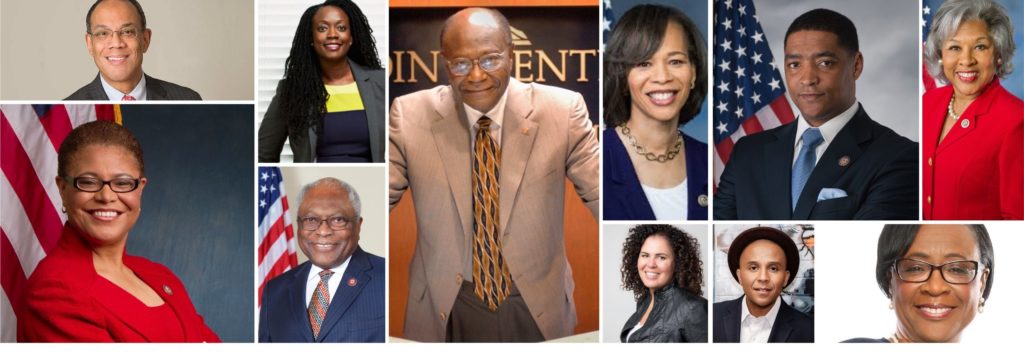
In 2020, the Joint Center celebrated its 50th Anniversary at the Eddie Williams Future of Black Communities Leadership Summit. We met virtually for three nights to help frame the economic policy agenda for Black communities for the next four years in the wake of COVID-19 and the national push against systemic racism. We heard from Biden-Harris Transition Team Outreach Director Ashley Allison, CBC Chair Karen Bass, ABFE President Susan Taylor Batten, CBC Chair-elect Joyce Beatty, Black Voters Matter Co-Founder LaTosha Brown, MSU Economics Professor Lisa Cook, Duke University Economics Professor William “Sandy” Darity, U.S. House Future of Work Co-Chair Lisa Blunt Rochester, Hudson-Webber Foundation CEO Melanca Clark, U.S. House Majority Whip James Clyburn, University of Chicago Professor Cathy Cohen, Hewlett Foundation President Larry Kramer, Dallas Mavericks CEO Cynthia Marshall, NPR’s Michel Martin, Lumina Foundation President Jamie Merisotis, Algorithms of Oppression author Safiya Noble, Black Economic Alliance Co-Chair Charles Phillips, Joint Center Louis Martin Awardee Congressman Cedric Richmond, Color of Change Executive Director Rashad Robinson, Ariel Investments CEO John Rogers, U.S. House Education & Labor Chair Bobby Scott, CNN’s Bakari Sellers, CBS’s Jamal Simmons, Sigma Pi Phi 48th Grand Sire Archon Gregory Vincent, Uber Chief Legal Officer Tony West, Jearline Williams, and pollster Terrance Woodbury.
Congresswoman Eddie Bernice Johnson (D-TX) also introduced a resolution recognizing the Joint Center’s 50th anniversary.
Refining our mission: We also celebrated our 50th anniversary by engaging in strategic planning about the future of the Joint Center and refining our mission statement as follows:
The Joint Center for Political and Economic Studies, America’s Black think tank, provides compelling and actionable policy solutions to eradicate persistent and evolving barriers to the full freedom of Black people in America. We are the trusted forum for leading experts and scholars to participate in major public policy debates and promote ideas that advance Black communities. We use evidence-based research, analysis, convenings, and strategic communications to support Black communities and a network of allies.
Expanding the Board
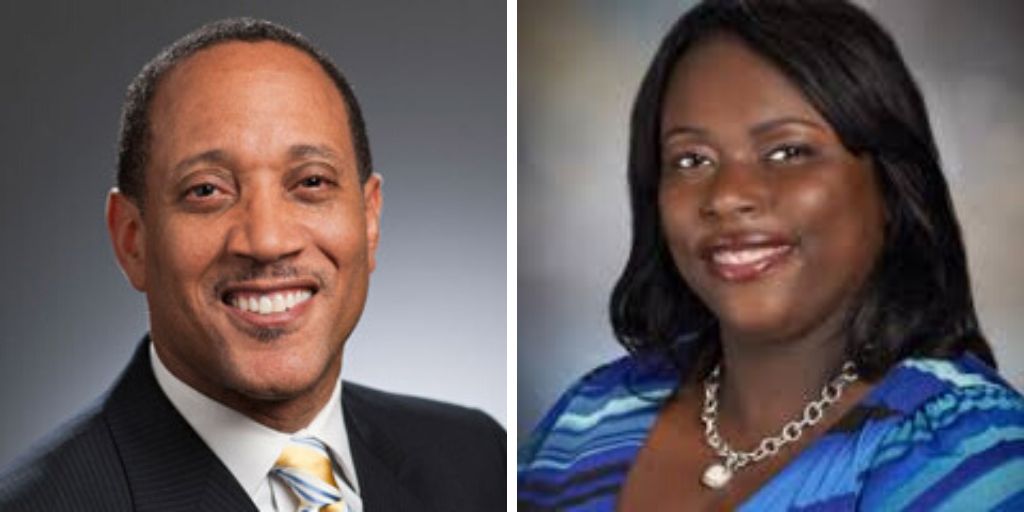
The Joint Center added two new board members in 2020—MacArthur Foundation Vice President and Chief Financial Officer Kenneth Jones and W.K. Kellogg Foundation Vice President for Program Strategy Carla Thompson Payton.
Our full board includes Barbara Johnson (Chair), A. Scott Bolden, Paula Boyd, Robert Hagans (Treasurer), Kenneth Jones, Chanelle Hardy, Spencer Overton (President), Dr. Dianne Pinderhughes, Robert Raben (Secretary), Carla Thompson Payton, Paul Thornell, and Antonio Williams.
Promoting and Expanding the Staff
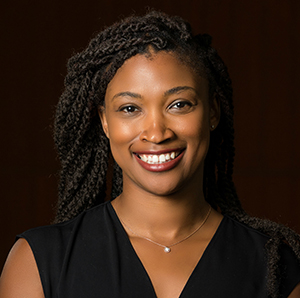
In 2020, Jessica Fulton (pictured above) was promoted from Director of Economic Policy to be the Joint Center’s Vice President.
In 2020, the Joint Center hired Dr. Dominique Harrison as our Tech Policy Director (listed above in the tech policy section), Stephanie Hall as Special Advisor to the President (pictured below to the left), and Aleya Jones (pictured below to the right) as a Research Assistant.
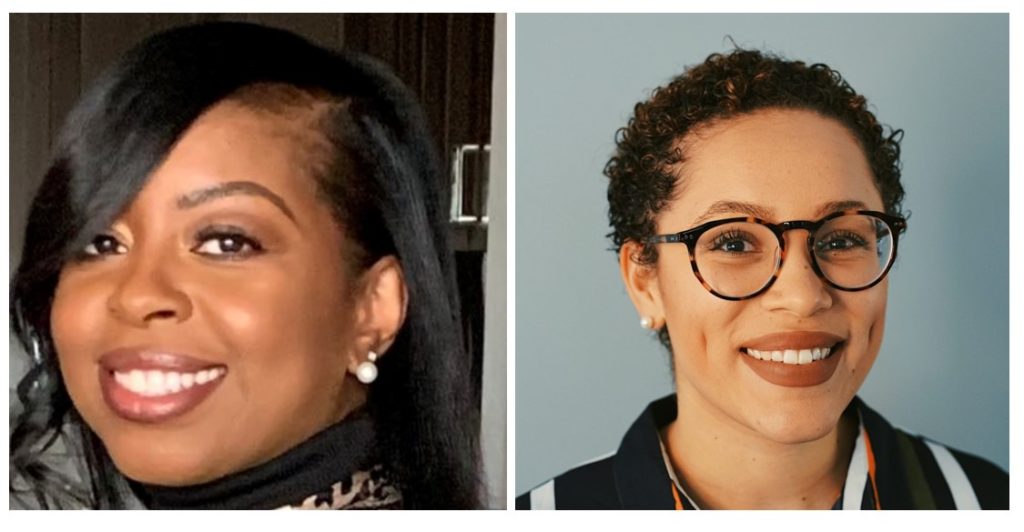
Our full staff includes Spencer Overton (President), Jessica Fulton (Vice President), Dr. LaShonda Brenson (Diversity & Inclusion Senior Fellow), Stephanie Hall (Special Advisor to the President), Dr. Dominique Harrison (Technology Policy Director), Victoria Johnson (Digital Communications Specialist), Aleya Jones (Research Assistant), and Attia Little (Office Manager). Our project focused on Black appointments in the new administration is directed by former White House Presidential Personnel Office Staff Assistant Glorie Chiza, and Hillary Aguilar handles operations and administrative support.
Thanks to our Financial Supporters
In 2020, the Joint Center received approximately 63% of our revenues from foundations, 30% from companies, and the remainder from individuals.
The William and Flora Hewlett Foundation awarded the Joint Center a $925,000 unrestricted anti-racism grant, Lumina Foundation awarded us a $750,000 grant for general capacity building and to build out our future of work in Black communities portfolio (we launched a search to hire a Workforce Policy Director to lead this work), and the Rockefeller Foundation awarded us a $500,000 grant for research and analysis related to small businesses. We’re also particularly grateful for the in-kind contributions of Mark Sobol of Longwave Partners, Reed Smith LLP, Venable LLP, and WilmerHale, and for the consistent support of GW Law School. We also appreciate the profile of the Joint Center in Blue Tent, a publication for philanthropy committed to social inclusion, ecological sustainability, and global interdependence.
We are very appreciative of all of our financial supporters.
Financial Supporters $500,000+
Hewlett Foundation
Lumina Foundation
The Rockefeller Foundation
Financial Supporters $100,000+$499,999
Annie E. Casey Foundation
Amazon
Apple
AT&T Services, Inc.
Boulé Foundation
Comcast
Democracy Fund
Facebook, Inc.
Google, Inc.
The Knight Foundation
Open Society Foundations
Rockefeller Brothers Fund
California Wellness Foundation
Voqal
Walmart Foundation
Financial Supporters $10,000-$99,999
ACTwireless
Advocate Aurora Health Care
Aflac
Alabama Power Company
Democracy Alliance
American Express
Ariel Investments
BET Networks
Bill & Melinda Gates Foundation
Charter Communications
Dell Technologies
Duke Energy
FedEx Corporation
GCM Grosvenor
General Motors Company
Goldman Sachs Foundation
IBM Corporation
Infor
JP Morgan Chase
Kapor Center for Social Impact
Lyft
Mastercard
Microsoft
NCTA-Internet & Television Association
PepsiCo
Peter G Peterson Foundation
Pfizer
PwC
Toyota Motor North America
Uber Technologies, Inc.
UPS – Global Affairs
Upstart
US Telecom
Verizon Foundation
Viacom
Waymo
Wells Fargo
William Blair
Financial Supporters $1,000-$9,999
A. Scott Bolden
American Honda Motor Co., Inc.
American Political Science Association
Antonio Williams
Barbara & Demetrius Whye
Barbara Johnson
Business Roundtable
Calpine Corporation
Carla Thompson Payton
Chanelle Hardy
Dianne Pinderhughes
Epsilon Phi Boule
Erika Martin
Exelon Corporation
Federal Street Strategies
FICO
GOOD ROBOT | BAD ROBOT
Jessica Gadling
Kenneth Jones
Keri Carkeek and Miles Schwartz
Kristina Hathaway
Liliana Monge
Medtronic
Michelle Chung
Mindset
MUFG Union Bank
National Association of Mutual Insurance Companies
New Hampshire Charitable Foundation
New York Life Insurance Company
Pamela Whittaker
Paul Thornell
Paula Boyd
Reed Smith
Retail Industry Leaders Association
Robert & Andrea Hagans
Robert Harris
Robert Raben
Spencer Overton
Structured Finance Association
TBES Pittman
Washington Government Relations Group

